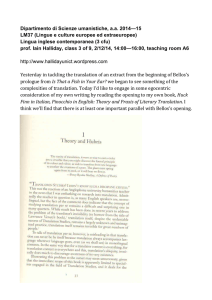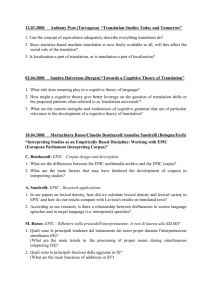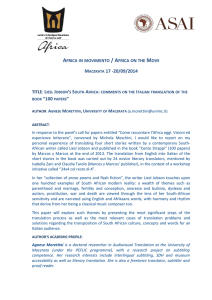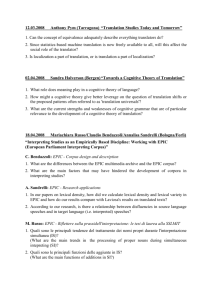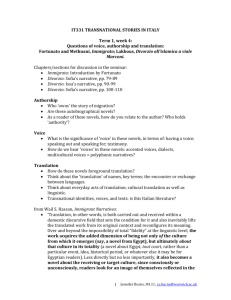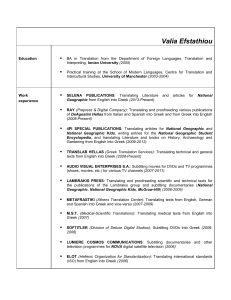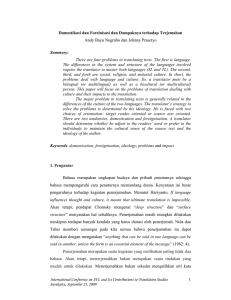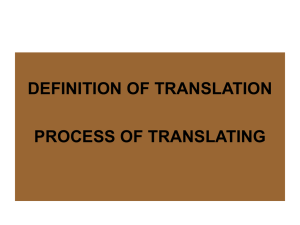ppt
advertisement
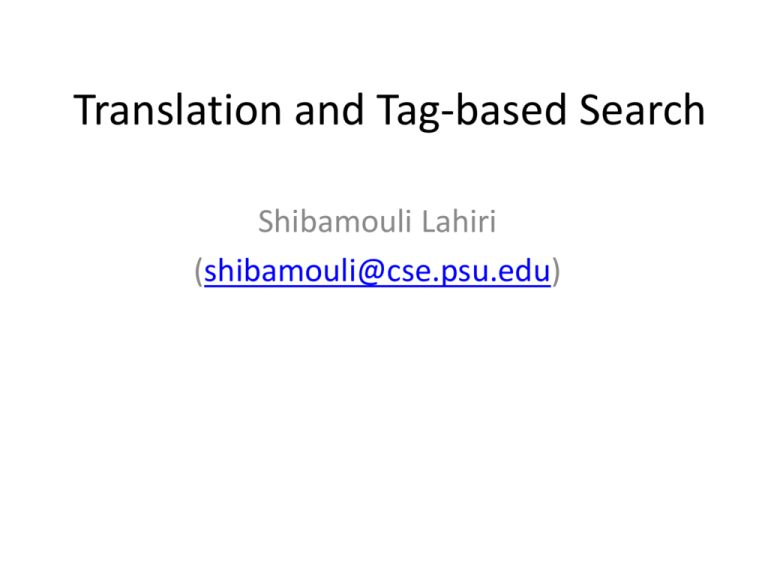
Translation and Tag-based Search
Shibamouli Lahiri
(shibamouli@cse.psu.edu)
Outline
• Brief recap
• Translation issues
• How can we use tags?
2
A Short Recap
• Search Engine on Ancient Greek corpus
• Query in Ancient Greek, Modern Greek or
English
3
A Short Recap
4
Issues Identified
• Translation/transliteration
Disambiguation[3,4,5,8]
Evaluation[9,10,11]
• Unit of Retrieval (pages or paragraphs)
• Query disambiguation
• Ranking
• Retrieval evaluation
• Named Entity Extraction[6]
• Summary in three languages
5
Outline
• Brief recap
• Translation issues
• How can we use tags?
6
Why Google Translate does not help?
•
Herodotus, "The Histories", Book 1, Chapter 1, Section 0
•
Ancient Greek: "Ἡροδότου Ἁλικαρνησσέος ἱστορίης ἀπόδεξις ἥδε, ὡς μήτε τὰ γενόμενα ἐξ
ἀνθρώπων τῷ χρόνῳ ἐξίτηλα γένηται, μήτε ἔργα μεγάλα τε καὶ θωμαστά, τὰ μὲν Ἕλλησι τὰ δὲ
βαρβάροισι ἀποδεχθέντα, ἀκλεᾶ γένηται, τά τε ἄλλα καὶ δι᾽ ἣν αἰτίην ἐπολέμησαν ἀλλήλοισι."
•
Human translation (A.D. Godley, Harvard University Press, 1920): "This is the display of the
inquiry of Herodotus of Halicarnassus, so that things done by man not be forgotten in time, and
that great and marvelous deeds, some displayed by the Hellenes, some by the barbarians, not
lose their glory, including among others what was the cause of their waging war on each
other."
•
Google Translate: "Herodotus Alikarnisseos istoriis apodexis ide, ὡς nor τὰ contemplated ἐξ
people unto χρόνῳ genitai faded, nor works great ll. THOMAS, as regards the ELLIS And the
varvaroisi were accepted, aklea genitai, GFs, but also self aitiin epolemisan not they,."
•
Yahoo Translate (AltaVista): "Ἡ[rodotoy] Ἁ[likarnisseos] ἱ[storiis] ἀ[podexis] ἥ[de], ὡ[s]
[mite] [t]ὰ [genomena] ἐ[x] ἀ[nthropon] [t]ῷ [chron]ῳ ἐ[xitila] [genitai], [mite] ἔ[rga] big [te]
[ka]ὶ [thomasta], [t]ὰ [m]ὲ[n] Ἕ[llisi] [t]ὰ [d]ὲ [barbaroisi] ἀ[podechthenta], ἀ[kle]ᾶ [genitai],
the [te] ἄ[lla] [ka]ὶ [di]᾽ ἣ[n] [a]ἰ[tiin] ἐ[polemisan] ἀ[lliloisi]."
7
Parallel Corpus
• Perseus Project (Ancient Greek English)
• 87 books by 30 authors (4M Greek words and 6M
English words)
• Europarl[1] has almost 30M for each language
• Koehn and Monz[2] used 15M training words for
translation ({Spanish, French, Finnish, German}
English) and roughly 60K test words
• Literary Translation alignment issue[12,13]
8
Open Source
• Giza++
• Moses
9
Other Corpora
• Project Gutenberg
• Greek Bible
• Sacred Texts
10
Ancient Greek Dictionary
•
•
•
•
Lexilogos
Kypros
Translatum
Ectaco
11
Outline
• Brief recap
• Translation issues
• How can we use tags?
12
Tag-based Search
13
Tag-based Search
14
How can tags help?
• Useful information regarding an object of
interest
• Blogs, microblogs and multimedia search
• Tag clouds – the larger the tag, the higher its
use
• Make “semantic” queries possible
• Query expansion[14] and Disambiguation[15]
15
Issues
• Language of tags (Greek or English)
• Level of tags (pages, paragraphs or sentences)
• Tags have their own set of problems[7]
Coverage
Ambiguity
Noise
Spam tags
16
References
1.
2.
3.
4.
5.
6.
7.
Europarl: A Parallel Corpus for Statistical Machine Translation.
Philipp Koehn. Machine Translation Summit (2005).
Shared Task: Statistical Machine Translation between European
Languages. Philipp Koehn and Christof Monz. Proceedings of the
ACL Workshop on Building and Using Parallel Texts (June 2005).
Using Structured Queries for Disambiguation in Cross-Language
Information Retrieval. David A. Hull. AAAI (1997).
Using the Web for Translation Disambiguation. Y. Zhang and P.
Vines. NTCIR-5 Workshop (2005).
Query Disambiguation for Cross-Language Information Retrieval
Using Web Directories. F. Kimura, A. Maeda, J. Miyazaki and S.
Uemura. Web Information Retrieval and Integration (2005).
Proper name translation in cross-language information retrieval.
H.H. Chen, S.J. Huang, Y.W. Ding and S.C. Tsai. ACL (1998).
Information Seeking with Social Signals: Anatomy of a Social Tagbased Exploratory Search Browser. Ed H. Chi and Rowan Nairn.
International Conference on Intelligent User Interfaces (2010).
17
References (Contd.)
8.
9.
10.
11.
12.
13.
14.
15.
Iterative Translation Disambiguation for Cross-Language Information
Retrieval. Christof Monz and Bonnie J. Dorr. In Proceedings of the 28th
Annual International ACM SIGIR Conference on Research and
Development in Information Retrieval (2005).
BLEU: a Method for Automatic Evaluation of Machine Translation. K.
Papineni. ACL (2002).
A paraphrase-based approach to machine translation evaluation. G.
Russo-Lassner, J. Lin and P. Resnik. (2005)
ORANGE: a Method for Evaluating Automatic Evaluation Metrics for
Machine Translation. Chin-Yew Lin and Franz Josef Och. ACL (2004).
Text-Translation Alignment. M. Kay and M. Röscheisen. Computational
Linguistics (1994).
HMM-based word alignment in statistical translation. S. Vogel, H. Ney
and C. Tillmann. ACL (1996).
Query expansion using lexical-semantic relations. E. M. Voorhees. SIGIR
(1994).
Senseval: An exercise in evaluating word sense disambiguation
programs. A. Kilgarriff. Proceedings of LREC (1998).
18
